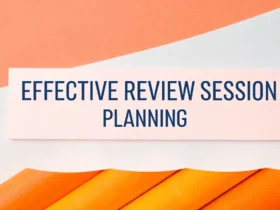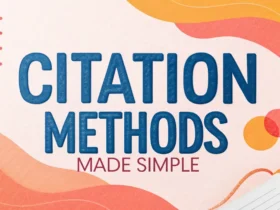Feeling overwhelmed by your studies? Do you find yourself constantly scrambling to meet deadlines and feeling like you’re not retaining information? You’re not alone. Many students face challenges when it comes to organizing their academic workload. A recent study showed that students with consistent study schedules perform 20% better than those without.
But don’t worry, there’s a solution. This article is about how you can take control of your academic life and thrive, and it’s all starts with effective study planning. A well-crafted plan can transform you from a stressed-out student into a confident, efficient learner.
In this guide, you’ll find insights into creating a personalized study plan that works for your unique needs and learning style. We’ll cover everything from setting realistic goals to incorporating breaks and managing distractions. With the right strategies, you can achieve academic success without sacrificing your well-being.
The Power of Study Planning: Why it Matters
Why bother with study planning? Is it just another chore to add to your already overflowing plate? The answer is a definite no. Thinking of it as merely a chore is selling short.
Effective study planning offers a wealth of benefits that go far beyond just getting good grades. Let’s delve into the advantages of taking the time to organize your academic life:
- Reduces Stress and Anxiety: Uncertainty and disorganization are big factors of academic stress. The constant worry about deadlines, forgetting assignments, and not having enough time can lead to a state of chronic anxiety. A study plan brings structure and predictability, making you know what needs to be done and when. This awareness can significantly reduce stress and promote a sense of calm.
- Improves Time Management: Time is a precious resource, and as a student, you are often juggling classes, assignments, extracurricular activities, and a social life. A study schedule forces you to assess how you spend your time and allocate it more efficiently. You’ll be better at prioritizing tasks, setting realistic deadlines, and avoiding procrastination. Data shows that students who manage their time effectively have more time for leisure activities and report higher levels of satisfaction.
- Enhances Focus and Concentration: When you sit down to study without a plan, it’s easy to get distracted. You might jump from one subject to another, get sidetracked by social media, or simply feel lost and unmotivated. A study plan provides a clear roadmap, helping you stay focused on the task at hand. When you know what you need to study and for how long, you’re less likely to waste time and more likely to concentrate effectively.
- Promotes Better Learning and Retention: Studying isn’t just about cramming information into your brain; it’s about truly understanding and retaining that information. Study planning encourages you to break down complex topics into smaller, more manageable chunks. It also allows you to space out your studying over time, a technique known as spaced repetition, which has been proven to enhance long-term memory and recall.
- Increases Academic Performance: All the benefits we’ve discussed ultimately lead to one thing: improved academic performance. By reducing stress, managing time, enhancing focus, and promoting better learning, a study plan sets you up for success. You’ll be able to tackle assignments with confidence, perform well on exams, and achieve your academic goals. Research consistently shows that students with study plans earn higher grades and have a greater sense of academic achievement.
- Develops Essential Life Skills: The skills you develop through study planning – organization, time management, prioritization, and self-discipline – aren’t just useful for academics; they’re essential for success in all areas of life. Whether you’re pursuing a career, starting a business, or managing a household, the ability to plan and execute effectively will be invaluable. Study planning is an investment in your future, helping you develop the skills you need to thrive in a complex and demanding world.
Study planning is not a magic bullet, it requires effort, discipline, and willingness to adapt and adjust.
Getting Started: Assessing Your Needs and Setting Goals
Before diving headfirst into creating a study schedule, it’s important to take a step back and assess your individual needs and set realistic goals. This initial assessment will help you tailor your plan to your unique circumstances and maximize its effectiveness.
Understanding Your Learning Style
Everyone learns differently. What works for one person may not work for another. Some people are visual learners, others are auditory learners, and still others are kinesthetic learners. Understanding your learning style is vital for choosing study techniques that resonate with you.
- Visual Learners: Visual learners learn best through seeing. They benefit from diagrams, charts, graphs, videos, and other visual aids.
- Auditory Learners: Auditory learners learn best through listening. They excel in lectures, discussions, and audio recordings.
- Kinesthetic Learners: Kinesthetic learners learn best through doing. They prefer hands-on activities, experiments, and practical applications.
There are online quizzes that can help you find your learning style if you’re not sure. Try out different study methods based on your learning style and see what works best for you.
Evaluating Your Current Academic Workload
Take an honest look at your current academic workload. How many classes are you taking? What are the major assignments and exams coming up? Are there any projects or presentations on the horizon? Assessing your workload will give you a clear picture of what you need to accomplish and how much time you’ll need to dedicate to each task.
Make a list of all your academic commitments, including:
- Classes and lectures
- Reading assignments
- Homework assignments
- Projects and presentations
- Exams and quizzes
- Research papers
Estimate the amount of time required for each commitment. Be realistic. Don’t underestimate the time needed to complete complex or challenging tasks.
Identifying Your Strengths and Weaknesses
Every student has their own unique set of strengths and weaknesses. Some may excel in math but struggle with writing. Others may be great at memorizing facts but have trouble understanding complex concepts. Identify your strengths and weaknesses.
- Strengths: Identify the subjects or topics you find easy to understand and enjoy studying. How can you leverage these strengths to boost your overall academic performance?
- Weaknesses: Identify the subjects or topics you find challenging or struggle with. How can you address these weaknesses and improve your understanding?
Setting Smart Goals
Once you have a good understanding of your needs and abilities, it’s time to set goals. Goals are the compass that guides your study efforts. They provide direction, motivation, and a sense of purpose. However, not all goals are created equal. To be effective, your goals should be SMART:
- Specific: Clearly define what you want to achieve. Instead of saying “I want to do better in math,” say “I want to improve my math grade from a C to a B.”
- Measurable: Establish criteria for measuring your progress. How will you know when you’ve achieved your goal? In the example above, the measurable criterion is improving your grade from a C to a B.
- Achievable: Set goals that are challenging but attainable. Don’t set yourself up for failure by setting unrealistic expectations.
- Relevant: Ensure your goals align with your overall academic and career aspirations. Are you taking this class because it’s required, or because it’s relevant to your interests and goals?
- Time-bound: Set a deadline for achieving your goal. When do you want to achieve your desired grade in math? By the end of the semester? By the midterm exam?
Examples of SMART goals:
- “I will complete all reading assignments for my history class by the end of each week.”
- “I will improve my score on the next chemistry quiz by 10%.”
- “I will write a draft of my research paper by the end of the month.”
Building Your Study Schedule: A Step-by-Step Guide
With your goals defined and your needs assessed, it’s time to start building your study schedule. This is where you’ll translate your aspirations into a concrete plan of action. The goal is to create a schedule that is both effective and sustainable, fitting seamlessly into your daily life.
1. Blocking Out Fixed Commitments
The first step in creating your study schedule is to identify and block out your fixed commitments. These are activities that occur at the same time each week and cannot be easily moved or changed. This might include:
- Classes and Lectures: Schedule in the exact times and locations of your classes.
- Work Schedule: Add in any work commitments.
- Extracurricular Activities: Include any sports practices, club meetings, or volunteer work.
- Appointments: Schedule any recurring medical appointments.
By blocking out these fixed commitments, you’ll get a clear picture of how much time you have left for studying and other activities.
2. Allocating Time for Each Subject
With your fixed commitments in place, you can now allocate time for each subject. How much time you allocate to each subject will depend on several factors, including:
- Course Difficulty: Allocate more time to subjects you find challenging or require more effort.
- Assignment Deadlines: Prioritize subjects with upcoming deadlines.
- Exam Schedules: Allocate more time to subjects with upcoming exams.
Spread your studying throughout the week rather than cramming it all into one or two days. This will help you retain information more effectively and avoid burnout. A good strategy is to break down each subject into smaller, more manageable tasks.
3. Incorporating Breaks and Rest
Study schedule shouldn’t be all work and no play. Incorporating breaks and rest is essential for maintaining focus, preventing burnout, and promoting overall well-being.
- Short Breaks: Take short breaks every hour to stretch, walk around, or grab a snack. Even a few minutes away from your studies can help refresh your mind and improve your concentration.
- Longer Breaks: Schedule longer breaks for meals, exercise, or socializing. Use this time to recharge and do things you enjoy.
- Restful Sleep: Prioritize getting enough sleep each night. Aim for 7-8 hours of quality sleep to improve cognitive function and academic performance.
4. Choosing Your Study Environment
The environment in which you study can significantly impact your focus and productivity. Some people prefer quiet, secluded spaces, while others thrive in more lively settings.
Consider these factors when choosing your study environment:
- Noise Level: Do you prefer complete silence or can you tolerate some background noise?
- Distractions: Are there potential distractions in your chosen environment, such as social media, television, or chatty friends?
- Comfort: Is the environment comfortable and conducive to studying? Do you have a comfortable chair, adequate lighting, and a stable workspace?
- Accessibility: Is the environment easily accessible and convenient? Can you study there whenever you need to?
Experiment with different study environments to find what works best for you. Some popular options include:
- Libraries: Libraries offer quiet, distraction-free spaces with access to a wealth of resources.
- Coffee Shops: Coffee shops can provide a more lively and stimulating environment, but be mindful of distractions.
- Home Study Space: Create a dedicated study space at home, free from clutter and distractions.
5. Using Time Management Techniques
Effective time management techniques can help you make the most of your study time and stay on track with your schedule. There are several popular time management techniques you can try:
- Pomodoro Technique: Work in focused bursts of 25 minutes, followed by a 5-minute break. After four Pomodoros, take a longer break of 20-30 minutes.
- Time Blocking: Divide your day into blocks of time and allocate specific tasks to each block. This helps you visualize your schedule and prioritize tasks.
- Eat the Frog: Tackle your most challenging or unpleasant task first thing in the morning. This gets it out of the way and allows you to focus on more enjoyable tasks later in the day.
- Prioritization Matrix: Create a matrix with four quadrants: Urgent and Important, Not Urgent but Important, Urgent but Not Important, and Not Urgent and Not Important. Prioritize tasks in the Urgent and Important quadrant, and delegate or eliminate tasks in the Not Urgent and Not Important quadrant.
6. Staying Flexible and Adaptable
No matter how carefully you plan your study schedule, unexpected events and changes in circumstances are bound to occur. It’s important to stay flexible and adaptable, and to be willing to adjust your schedule as needed.
- Build in Buffer Time: Leave some extra time in your schedule for unexpected delays or emergencies.
- Be Willing to Adjust: If something isn’t working, don’t be afraid to change it. Experiment with different techniques and approaches until you find what works best for you.
- Don’t Be Too Hard on Yourself: Everyone has off days. If you miss a study session or fall behind on your schedule, don’t beat yourself up about it. Just get back on track as soon as possible.
Choosing the Right Study Techniques
A study schedule is only as effective as the study techniques you employ. Experiment with different methods and find what works best for your unique learning style and the demands of each subject.
Active Recall: Testing Yourself Regularly
Active recall is the process of actively retrieving information from memory, rather than passively rereading or reviewing notes. This technique has been proven to be highly effective for improving learning and retention.
- Flashcards: Create flashcards with questions on one side and answers on the other. Use them to test yourself regularly on key concepts and facts.
- Practice Quizzes: Take practice quizzes and exams to assess your understanding of the material.
- Teach Someone Else: Explaining concepts to someone else forces you to actively recall and organize the information in your mind.
Spaced Repetition: Distributing Learning Over Time
Spaced repetition is a learning technique that involves reviewing material at increasing intervals over time. Instead of cramming all your studying into one or two sessions, you distribute it over several days or weeks. This helps to consolidate information in your long-term memory.
- Review Notes Regularly: Review your notes shortly after each class, and then again several days or weeks later.
- Use Spaced Repetition Software: There are several software programs and apps that can help you implement spaced repetition, such as Anki and Memrise.
Interleaving: Mixing Up Different Subjects
Interleaving is the practice of mixing up different subjects or topics during your study sessions. Instead of studying one subject for hours at a time, you switch between different subjects or topics.
This technique forces your brain to work harder to retrieve and apply information. A strategy to help you remember information better.
Mind Mapping: Visualizing Concepts and Connections
Mind mapping is a visual technique for organizing and representing information. It involves creating a diagram with a central topic or idea in the center, and then branching out with related subtopics and ideas.
- Visual Representation: Mind maps help you visualize complex concepts and connections between different ideas.
- Organization: Mind maps help you organize your thoughts and create a structured overview of the material.
- Memory: Mind maps can improve memory and recall by creating visual associations with the information.
The Feynman Technique: Simplifying and Explaining
The Feynman Technique is a learning strategy that involves simplifying and explaining concepts as if you were teaching them to someone else. By breaking down complex ideas into simpler terms, you can identify gaps in your understanding and improve your comprehension.
- Choose a Concept: Select a concept or topic you want to learn.
- Explain It Simply: Write down an explanation of the concept in simple, easy-to-understand language.
- Identify Gaps: If you struggle to explain something clearly, identify the gaps in your understanding and go back to the source material to fill them in.
- Simplify and Analogize: Continue to simplify and analogize the explanation until it is clear and concise.
Creating a Conducive Study Environment
The right study environment can make a big difference in your ability to focus and learn. Find a space that is quiet, comfortable, and free from distractions.
- Minimize Distractions: Turn off your phone, close unnecessary tabs on your computer, and let others know that you need uninterrupted time to study.
- Optimize Lighting: Make sure you have adequate lighting to avoid eye strain.
- Maintain a Comfortable Temperature: Adjust the temperature to a comfortable level to avoid feeling too hot or too cold.
- Keep It Organized: Keep your study space organized and free from clutter. This will help you stay focused and avoid feeling overwhelmed.
Overcoming Common Study Planning Challenges
Even with the best intentions, you’re likely to encounter challenges along the way.
Procrastination: Breaking the Cycle
Procrastination is the act of delaying or postponing tasks, often due to fear, anxiety, or a lack of motivation. It’s a common challenge for students.
- Identify the Root Cause: Why are you procrastinating? Are you afraid of failure? Do you find the task boring or overwhelming?
- Break Down Tasks: Break down large, daunting tasks into smaller, more manageable steps.
- Set Realistic Goals: Set achievable goals for each study session and reward yourself when you reach them.
- Use Time Management Techniques: Implement time management techniques.
- Eliminate Distractions: Remove potential distractions.
- Seek Support: If procrastination is a persistent problem, seek support from a counselor, advisor, or study group.
Distractions: Staying Focused
Distractions are anything that divert your attention away from your studies. They can come in many forms, including social media, television, noisy environments, and intrusive thoughts.
- Identify Your Distractions: What are the biggest sources of distraction for you?
- Create a Distraction-Free Environment: Find a quiet, secluded space where you can study without interruptions.
- Use Website Blockers: Install website blockers to prevent yourself from accessing social media and other distracting websites during study sessions.
- Turn Off Notifications: Disable notifications on your phone and computer to avoid being interrupted by incoming messages or alerts.
- Practice Mindfulness: Learn to focus on the present moment and resist the urge to get distracted by thoughts or urges.
Burnout: Preventing Mental Fatigue
Burnout is a state of emotional, physical, and mental exhaustion caused by prolonged or excessive stress. It can lead to decreased motivation, impaired performance, and a negative attitude towards studying.
- Recognize the Symptoms: Be aware of the symptoms of burnout, such as fatigue, irritability, difficulty concentrating, and a lack of motivation.
- Prioritize Self-Care: Make time for activities that help you relax, recharge, and reduce stress, such as exercise, meditation, hobbies, and socializing.
- Set Realistic Expectations: Don’t try to do too much at once. Set achievable goals and break down tasks into smaller, more manageable steps.
- Take Breaks: Incorporate regular breaks into your study schedule to avoid mental fatigue.
- Seek Support: Talk to a friend, family member, counselor, or advisor if you’re feeling overwhelmed or burnt out.
Lack of Motivation: Finding Your Drive
Lack of motivation is a common challenge for students, especially when faced with difficult or uninteresting subjects. It can lead to procrastination, decreased effort, and poor academic performance.
- Identify Your Goals: What are you hoping to achieve through your studies? How will your academic success help you achieve your long-term goals?
- Find Meaning in Your Studies: Try to connect your studies to your personal interests and values. How does what you’re learning relate to your life, your career aspirations, or your passion for making a difference in the world?
- Set Small, Achievable Goals: Break down large tasks into smaller, more manageable steps.
- Reward Yourself: Celebrate your successes, no matter how small.
- Seek Inspiration: Read books, watch videos, or listen to podcasts that inspire and motivate you.
- Surround Yourself with Positive Influences: Spend time with people who are supportive, encouraging, and motivated.
Tools and Resources for Effective Study Planning
In today’s digital age, there’s a plethora of tools and resources available to help you plan and manage your studies more effectively.
Digital Calendars and Planners: Staying Organized
Digital calendars and planners are a convenient and versatile way to keep track of your schedule, deadlines, and appointments. They offer a range of features, such as reminders, notifications, and the ability to sync across multiple devices.
- Google Calendar: A free, web-based calendar that allows you to create and share events, set reminders, and sync with other Google services.
- Microsoft Outlook Calendar: A calendar and email client that integrates with other Microsoft Office applications.
- Apple Calendar: A calendar app built into macOS and iOS devices.
- Trello: A project management tool that uses boards, lists, and cards to help you organize tasks and deadlines.
- Asana: A work management platform that allows you to create projects, assign tasks, set deadlines, and track progress.
Note-Taking Apps: Capturing and Organizing Information
Note-taking apps are essential for capturing and organizing information from lectures, readings, and research. They offer a range of features, such as text formatting, image insertion, and the ability to sync across multiple devices.
- Evernote: A popular note-taking app that allows you to create and organize notes, web clippings, and other types of content.
- OneNote: A note-taking app from Microsoft that integrates with other Microsoft Office applications.
- Notion: A versatile workspace that combines note-taking, project management, and database functionality.
- Google Docs: A free, web-based word processor that allows you to create and share documents, collaborate with others, and access your files from any device.
Flashcard Apps: Mastering Key Concepts
Flashcard apps are a fun and effective way to memorize key concepts, facts, and vocabulary. They use spaced repetition algorithms to help you review material at increasing intervals, improving long-term retention.
- Anki: A powerful flashcard app that uses spaced repetition to help you learn and memorize information.
- Quizlet: A popular flashcard app that allows you to create and share flashcards, play learning games, and study with friends.
- Memrise: A language learning app that uses flashcards, videos, and other interactive content to help you learn new languages.
Focus and Productivity Apps: Eliminating Distractions
Focus and productivity apps help you eliminate distractions, manage your time, and stay on track with your studies. They offer a range of features, such as website blockers, time trackers, and focus timers.
- Freedom: A website and app blocker that allows you to block distracting websites and apps on all your devices.
- Forest: A productivity app that encourages you to stay focused by planting a virtual tree. If you leave the app to visit a distracting website, your tree will die.
- Focus@Will: A music streaming service that provides scientifically engineered music to help you focus and concentrate.
- Brain.fm: A music app that uses AI to create personalized music to improve focus, relaxation, and sleep.
Study Group Platforms: Collaborating with Peers
Study group platforms facilitate collaboration and communication among students. They provide a space to share notes, ask questions, discuss concepts, and support each other’s learning.
- Discord: A popular messaging and voice chat platform that allows you to create servers and channels for study groups, discussions, and other types of collaboration.
- Slack: A workplace communication platform that can also be used for study groups.
- Google Meet: A video conferencing platform that allows you to meet with your study group online.
- Zoom: A video conferencing platform that offers a range of features for online meetings, webinars, and collaboration.
Online Learning Platforms: Accessing Educational Resources
Online learning platforms provide access to a wealth of educational resources, such as courses, tutorials, and videos.
- Coursera: An online learning platform that offers courses, specializations, and degrees from top universities and institutions around the world.
- edX: A non-profit online learning platform that offers courses from leading universities and institutions.
- Khan Academy: A free online learning platform that provides educational videos and practice exercises for a wide range of subjects.
- Udemy: An online learning platform that offers courses on a variety of topics, taught by expert instructors.
Maintaining Your Study Plan: Consistency is Key
Creating a study schedule is only half the battle. The real challenge lies in maintaining it over time. Consistency is key to achieving your academic goals and reaping the rewards of effective study planning.
Regularly Review and Revise Your Schedule
As your academic workload changes and new challenges arise, it’s important to regularly review and revise your study schedule. This will help you stay on track and ensure that your plan remains relevant and effective.
- Weekly Review: Take some time each week to review your schedule and assess your progress. Did you achieve your goals for the week? Did you encounter any challenges or setbacks?
- Monthly Revision: At the end of each month, take a more in-depth look at your schedule and make any necessary revisions. Have your priorities changed? Do you need to allocate more or less time to certain subjects?
- Semester Overhaul: At the beginning of each semester, create a new study schedule that reflects your current academic workload and goals.
Track Your Progress and Celebrate Successes
Tracking your progress and celebrating your successes can help you stay motivated and committed to your study plan. It provides a sense of accomplishment and reinforces positive habits.
- Keep a Study Journal: Record your study sessions, assignments completed, and grades achieved. This will help you track your progress over time and identify areas where you need to improve.
- Use a Progress Tracker: Create a spreadsheet or use a progress tracking app to monitor your progress towards your goals.
- Reward Yourself: Set up a reward system to celebrate your successes. Treat yourself to something you enjoy when you achieve a milestone or reach a goal.
Seek Support and Accountability
Surrounding yourself with support and accountability can help you stay on track with your study plan, especially when you’re feeling overwhelmed or discouraged.
- Join a Study Group: Connect with other students who are studying the same subjects.
- Find a Study Buddy: Partner with a classmate who is also committed to effective study planning.
- Talk to Your Professor or Advisor: Seek guidance and support from your professors or academic advisors.
- Share Your Goals with Family and Friends: Let your loved ones know about your academic goals and ask for their support.
Learn from Setbacks and Adapt to Change
No matter how carefully you plan your study schedule, setbacks and unexpected events are bound to occur. It’s important to learn from these experiences and adapt your plan accordingly.
- Don’t Dwell on Mistakes: Everyone makes mistakes. Don’t beat yourself up about it. Learn from your errors and move on.
- Identify the Cause of Setbacks: What caused you to fall behind on your schedule? Was it a lack of motivation, a lack of time, or an unexpected event?
- Adjust Your Plan: Based on what you’ve learned, adjust your plan to prevent similar setbacks in the future.
- Stay Flexible: Be willing to adapt to changing circumstances and unexpected events. Life is unpredictable, and your study schedule needs to be flexible enough to accommodate these changes.
Is a Study Plan Worth It?
So, is creating and sticking to a study schedule truly worth the effort? Given the benefits we’ve explored – reduced stress, improved time management, enhanced focus, better learning, increased academic performance, and the development of essential life skills – the answer is a resounding yes.
However, it’s important to remember that a study plan is not a magic bullet. It’s a tool that, when used effectively, can help you achieve your academic goals and unlock your full potential. The success of your study plan depends on your commitment, discipline, and willingness to adapt and adjust.
So, take the time to assess your needs, set realistic goals, and create a study plan that works for you. Experiment with different study techniques and find what resonates with your learning style. Surround yourself with support and accountability, and learn from setbacks.
You can transform your academic life and achieve the success you deserve. Your journey to academic success begins with effective study planning. Embrace the power of planning, and unlock your potential for learning and achievement.















Leave a Reply
View Comments